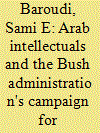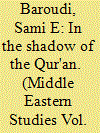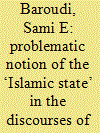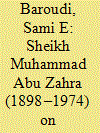|
|
|
Sort Order |
|
|
|
Items / Page
|
|
|
|
|
|
|
| Srl | Item |
| 1 |
ID:
078410


|
|
|
|
|
| Publication |
2007.
|
| Summary/Abstract |
This article considers how Arab intellectuals represent the United States and American foreign policy in their editorial contributions to Arabic newspapers. As a case study, it examines Arab intellectuals' reactions to the George W. Bush Administration's campaign to effect democratic change in the Middle East, as articulated in the Administration's 2004 Greater Middle East Initiative (hereafter GMEI or Initiative). I argue that the predominantly hostile reactions to the GMEI stemmed mainly from a closed and negative image of the United States permeating Arab intellectual circles. This negative image is the product of the history of American policy towards the region and, equally important, of the beliefs, values, and formative experiences of Arab intellectuals. The article concludes by addressing ways to ameliorate this image
|
|
|
|
|
|
|
|
|
|
|
|
|
|
|
|
| 2 |
ID:
082003


|
|
|
| 3 |
ID:
181290


|
|
|
|
|
| Summary/Abstract |
This paper’s departure point is Hannah Arendt’s assertion that the ‘human condition’ is defined by our ‘plurality’. It contends that without having read Arendt two contemporary Islamists – Sheikhs Muhammad Abu Zahra and Wahbah al-Zuhaili – arrive at similar conclusions regarding the human condition. While Arendt draws on European thought, Abu Zahra and Zuhaili anchor their views in the Islamic tradition. The literature has tended to treat these two mega-traditions – the largely secular and liberal western tradition and the Islamic tradition – as being at odds. The contribution of this paper lies in demonstrating that scholars who belong to these two traditions can often make similar assertions regarding the centrality of diversity to the human condition. The paper demonstrates how the two scholar-sheiks draw on the Islamic tradition to argue that the grouping of humanity into separate nations and religions is natural and divinely ordained. Abu Zahra and Zuhaili maintain that peace is the norm in the relationship between Muslim and non-Muslim states, since religious differences do not constitute valid grounds for fighting. While they anchor this assertion in the Islamic tradition,it also reflects their embrace of Arendt’s liberal notion that as humans we are defined by our diversity.
|
|
|
|
|
|
|
|
|
|
|
|
|
|
|
|
| 4 |
ID:
097790


|
|
|
|
|
| Publication |
2010.
|
| Summary/Abstract |
Academics have paid far more attention to Islamist movements than to the political discourse of contemporary Islamist authors. This is regrettable for four main reasons. First, Islamists address issues of major importance to their societies and these societies' relations with the external world, especially the West. Understanding their discourse holds the key to a better understanding of Islamist movements. Second, Islamists form an integral component of the Arab intelligentsia. As opinion shapers they influence the attitudes, beliefs and value systems of Arab publics. Third, Islamists have been writing extensively and critically about the United States, especially since the end of the Cold War. It is of great importance to understand why they are so 'preoccupied' with America and why they view it the way they do. Finally, Islamists write in a distinct style that leans heavily, and in complex ways, on the sacred text (the Qur'an). It is intriguing and intellectually stimulating to analyze the substance and style of their discourse and to contextualize it historically. This article focuses on one specific and critical aspect of contemporary Islamist discourse: its treatment of the United States.
|
|
|
|
|
|
|
|
|
|
|
|
|
|
|
|
| 5 |
ID:
061100


|
|
|
| 6 |
ID:
175428


|
|
|
|
|
| Summary/Abstract |
This article examines the writings of Arab intellectuals on the ideas that inspired the Islamic State organization (ISIS) through a survey of Arabic-language books, scholarly articles, and editorials in leading newspapers during the group’s 2014– 18 heyday. This probe focuses on one broad, recurring question that permeated these writings: namely, what were ISIS’s ideational sources? In addition to shedding light on the rich perspectives that Arab authors offered on this question and the extent to which they disagreed, this article demonstrates how Arab intellectuals were united in their intense hostility toward ISIS.
|
|
|
|
|
|
|
|
|
|
|
|
|
|
|
|
| 7 |
ID:
174167


|
|
|
|
|
| Summary/Abstract |
This article examines the conceptualization of the 'Islamic state' by one reputable Arab Islamist scholar, Muhammad Abu Zahra. It contends that he fails to provide internally consistent answers to four key questions. First, does the Islamic state presently exist, or is it yet to be established; and if the latter is the case then by whom and how? Second, was the historic caliphate which allegedly extended from the death of the Prophet until the Ottoman caliphate’s dissolution an 'Islamic state'? Third, is the 'Islamic state' universal in scope, or can there be several Islamic states at the same time? Fourth, what is the relationship between the 'Islamic state' and Islamic unity; and can the latter be achieved outside the context of the 'Islamic state'? I argue that Abu Zahra’s conceptualization of the 'Islamic state' is heavily influenced by 'modern'/European ideas about the nation-state; as a sovereign entity with the authority to impose its writ over its citizens and territory. I conclude that the 'Islamic state' is a stillborn idea being a hybrid of two highly incompatible sets of genes: the Islamic tradition, which does not conceive the Umma in territorial terms, and the 'modern'/ European notion of the territorial state.
|
|
|
|
|
|
|
|
|
|
|
|
|
|
|
|
| 8 |
ID:
158080


|
|
|
|
|
| Summary/Abstract |
The literature on Political Islam has not devoted ample space to the intellectual contributions of contemporary moderate Islamists. This article attempts to rectify this by examining the international relations discourse of a twentieth-century Egyptian religious scholar: Sheikh Muhammad Abu Zahra. Despite Abu Zahra's prominence in the Islamic world, his writings have received scant attention from academics. The article provides a close reading of his three principal works on international relations: al-ʿAlaqat al-Duwaliyya fi al-Islam, Nazhariyat al-Harb fi al-Islam and al-Wihda al-Islamiyya; as well as a fourth work with a significant bearing on the subject: al-Mujtamaʿ al-Insani fi Dhil al-Islam. It contends that Abu Zahra's international relations discourse is part of a more than a century-old tradition of theorizing on international relations that dates back to the religious reformers Jamal al-Din al-Afghani and Muhammad Abdu. Accordingly, Abu Zahra is treated here as an exemplar of what I refer to as the moderate and reformist school in contemporary Islam, in contradistinction to the radical school that is associated with salafi-jihadist figures and movements. A close analysis of Abu Zahra's international relations discourse thus provides penetrating insights on one pivotal, albeit understudied, dimension of this reformist/moderate current in contemporary Islam: its perspectives on international relations.
|
|
|
|
|
|
|
|
|
|
|
|
|
|
|
|
| 9 |
ID:
151860


|
|
|
|
|
| Summary/Abstract |
In recent years, radical and violent Islamist movements – such as al-Qaeda and its offshoot the Islamic State in Iraq and Syria – have seized the spotlight. A corollary of this preoccupation has been the proliferation of studies on the political thought of radical Islamist figures such as Abu Muhammad al-Maqdisi, Ayman al-Zawahiri and Osama bin-Laden. By contrast, scant attention has been paid to the thought of moderate contemporary Sunni Islamist scholars. This article attempts to rectify this situation by focusing on the international relations discourse of a prominent Syrian Islamist thinker Sheikh Wahbah al-Zuhaili (hereafter Zuhaili). The article examines Zuhaili's views on three central and interrelated topics: (1) the nature and underpinning principles of international relations; (2) war; and (3) the role of international law and international norms and conventions in international relations. By shedding light on Zuhaili's thought and situating it in its proper ideational and historical contexts, the article concludes that radical Islamist ideology is at the periphery of contemporary Islamist conceptualizations of international relations while the epicentre is held by mainstream Islamists whose perspectives on international relations are fairly compatible with prevalent western views, especially those emanating from the Realist school.
|
|
|
|
|
|
|
|
|
|
|
|
|
|
|
|
| 10 |
ID:
128207


|
|
|
|
|
| Publication |
2014.
|
| Summary/Abstract |
This paper examines the perspectives on international relations of a leading Islamist scholar, Sheikh Yusuf al-Qaradawi. The discussion of Qaradawi's views is organized around seven themes that feature prominently in his international relations discourse. The paper argues that Qaradawi's views are central to how Islamists conceptualize international relations; and that they intersect with the views of secular Arab nationalists, Third World and Western critics of the prevailing international order, as well as neoclassical and righteous realists. Finally, the paper sheds light on the centrality of the sacred text (the Qur'an) to the international relations discourse of Islamists, such as Qaradawi.
|
|
|
|
|
|
|
|
|
|
|
|
|
|
|
|
| 11 |
ID:
110339


|
|
|
|
|
| Publication |
2011.
|
| Summary/Abstract |
This article considers US-French collaboration on Lebanon, especially between 2004 and 2008. It examines the political background to such collaboration and its manifestations at the United Nations Security Council and in the two powers' relations with Lebanon, Syria, and other regional players. We argue that the changed political landscape in the Middle East following the 2003 US invasion of Iraq (particularly Syrian policy in Lebanon and towards Iraq) as well as developments in the Lebanese theater since the turn of the 21st century prompted such collaboration. After briefly discussing the insights of Realist and Liberal Internationalist theories of international relations, the article concludes that Daniel Deudney's Republican Security Theory offers the most plausible explanation for US-French collaboration on Lebanon.
|
|
|
|
|
|
|
|
|
|
|
|
|
|
|
|
|
|
|
|
|